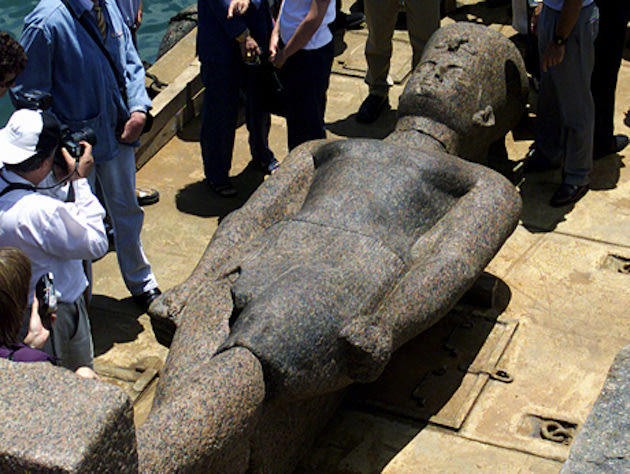Until a decade ago, no one knew if Heracleion, believed to be an ancient harbor city, was fiction or real. Now, reports the Telegraph, the researchers who found it—150 feet beneath the surface of Egypt's Bay of Aboukir—are sharing some of the amazing historical artifacts preserved there.
The finds include 64 ships, 16-foot-tall statues, 700 anchors and countless gold coins and smaller artifacts.
According to underwater archeologist Franck Goddio, credited with having discovered the site, the city was probably built sometime around the 8th century B.C., which makes it older than the famed city of Alexandria. Over the years, it fell victim to a number of natural disasters before being swallowed by the sea, probably around A.D. 700.
“We are just at the beginning of our research,” said Goddio. “We will probably have to continue working for the next 200 years for [it] to be fully revealed and understood.”
It's believed that gradual soil erosion eventually caused Heracleion to fall into the Mediterranean. “It is now clear that a slow movement of subsidence of the soil affected this part of the south-eastern basin of the Mediterranean,” Goddio writes on his site. “The rise in sea level—already observed in antiquity—also contributed significantly to the submergence of the land.”
The Telegraph reports that researchers are beginning to more fully understand what daily life was like in the city, also called “Thonis.” Mainly, they describe it as having served as the main hub for sea traffic entering the region, including all trade from Greece.
“We are getting a rich picture of things like the trade that was going on there and the nature of the maritime economy in the Egyptian late period,” Damian Robinson, director of the Oxford Centre for Maritime Archaeology at the University of Oxford, told the Telegraph. Robinson is part of the team that has been busy uncovering artifacts from Heracleion's sunken remains.
“It was the major international trading port for Egypt at this time,” Robinson added. “It is where taxation was taken on import and export duties. All of this was run by the main temple.”
The city is also believed to have had a rich cultural history. Helen was said to have visited it with her lover Paris shortly before the onset of the Trojan War.
The finds include 64 ships, 16-foot-tall statues, 700 anchors and countless gold coins and smaller artifacts.
According to underwater archeologist Franck Goddio, credited with having discovered the site, the city was probably built sometime around the 8th century B.C., which makes it older than the famed city of Alexandria. Over the years, it fell victim to a number of natural disasters before being swallowed by the sea, probably around A.D. 700.
“We are just at the beginning of our research,” said Goddio. “We will probably have to continue working for the next 200 years for [it] to be fully revealed and understood.”
It's believed that gradual soil erosion eventually caused Heracleion to fall into the Mediterranean. “It is now clear that a slow movement of subsidence of the soil affected this part of the south-eastern basin of the Mediterranean,” Goddio writes on his site. “The rise in sea level—already observed in antiquity—also contributed significantly to the submergence of the land.”
The Telegraph reports that researchers are beginning to more fully understand what daily life was like in the city, also called “Thonis.” Mainly, they describe it as having served as the main hub for sea traffic entering the region, including all trade from Greece.
“We are getting a rich picture of things like the trade that was going on there and the nature of the maritime economy in the Egyptian late period,” Damian Robinson, director of the Oxford Centre for Maritime Archaeology at the University of Oxford, told the Telegraph. Robinson is part of the team that has been busy uncovering artifacts from Heracleion's sunken remains.
“It was the major international trading port for Egypt at this time,” Robinson added. “It is where taxation was taken on import and export duties. All of this was run by the main temple.”
The city is also believed to have had a rich cultural history. Helen was said to have visited it with her lover Paris shortly before the onset of the Trojan War.



 Getting your child with special needs to relax and focus can be a difficult job. There are many situations in which our children need some help to settle down. Whether your child is excited by something fun and enjoyable or something scary and unfamiliar, a calming exercise may be needed to move on to the next routine or activity.
Getting your child with special needs to relax and focus can be a difficult job. There are many situations in which our children need some help to settle down. Whether your child is excited by something fun and enjoyable or something scary and unfamiliar, a calming exercise may be needed to move on to the next routine or activity. Keep in mind, there may not be one activity that always works for your child. Some activities will not come naturally to your child.
Keep in mind, there may not be one activity that always works for your child. Some activities will not come naturally to your child.